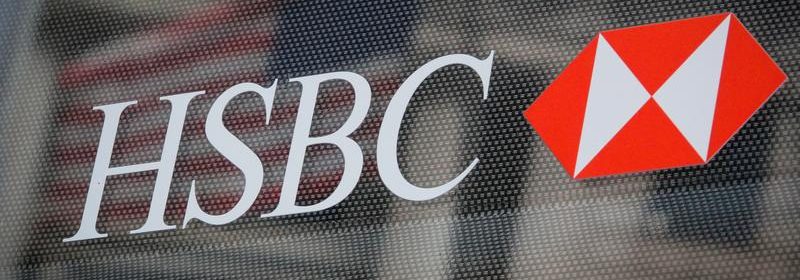HSBC curbs profit and payout ambitions, bets on Asia wealth

HONG KONG/LONDON (Reuters) – HSBC Holdings PLC on Tuesday abandoned its long-term profitability target, and unveiled a revised strategy focused mainly on wealth management in Asia after the COVID-19 shock saw its annual profits drop sharply.
Citing the low interest rate environment and tough market conditions, HSBC ditched its goal of achieving a return on tangible equity of 10 to 12%, and said instead it will aim for 10% over the medium term.
The moves by Europe’s biggest bank underlined the tough outlook for the banking sector as low interest rates worldwide take their toll, even as a global markets rally boosted the prospects for the wealth management business.
The margin pressure and mounting losses in Europe have forced HSBC to redouble its focus on Asia which provided a dominant share of the bank’s profits in 2020.
“The big structural shift that’s gone on since we set out the plan last February has really been the shift in interest rates down toward zero in most markets that we do business in,” Ewen Stevenson, HSBC’s group chief financial officer, told Reuters.
“If interest rates were 100 basis points higher today across the board it would improve our returns by 3 percentage points.”
The bank said it would pay a dividend of $0.15 a share in cash, the first payout announced since October 2019, after the Bank of England blocked all big lenders from paying dividends or buying back shares in 2020 to conserve capital.
However, it said it would stop the previous practice of paying a quarterly dividend, and target a payout ratio of between 40% and 55% of reported earnings per ordinary share from 2022 onwards, well below the level in recent years.
HSBC also said it will make hefty cuts to some of its back office functions such as technology and operations, without specifying the number of jobs affected. The lender cut 11,000 jobs in 2020 and had signalled it would make further reductions.
The announcement came as HSBC reported profit before tax of $8.78 billion for 2020, down 34% from a year earlier but just above the $8.33 billion average of analysts’ estimates compiled by the bank.
HSBC’s Hong Kong shares were up 0.55% by 0750 GMT, lagging the benchmark Hang Seng index as investors considered the bank’s dividend cut and modest strategic ambitions.
Investors were resigned to HSBC’s more modest ambitions and growth target.
“It’s hard to have high ambitions in this climate, or at least dangerous to declare them if they exist,” said Hugh Young, managing director at Aberdeen Standard, the bank’s 9th-largest shareholder.
ASIA FOCUS, SHRINKING ELSEWHERE
HSBC said that its growth in Asia for the next five years will be driven by around $6 billion of additional investment in its wealth management and international wholesale business.
“Everyone realises how big an economic opportunity China and India are but HSBC is starting to realise no-one has the opportunity to serve that wealth creation like they do,” said Dan Lane, a senior analyst at UK digital broker Freetrade.
“The prospect doesn’t come cheap but it looks like the company is finally ready to pump cash into getting even more East Asian customers on board.”
Profit from the bank’s wealth management and personal banking division in Asia was $5 billion in 2020, but its cash cow Hong Kong accounted for almost all of this, despite its controversial decision to assist Hong Kong police with investigations into pro-democracy activists.
Elsewhere in the world, HSBC said it is in talks with a potential buyer for its troubled France retail banking unit, which it has been trying to dispose for over a year, but no deal has been confirmed.
It said it expected to make a loss on the sale given the business’ underlying performance.
The bank also said it is “exploring organic and inorganic options” for its U.S. retail banking franchise, suggesting it is trying to sell the unit where it has already closed 80 branches in the last year.
Reuters, and others, have reported the bank is trying withdraw from U.S. retail banking.
HSBC’s Mexico operations made a loss of $187 million in 2020, as many of its branches remained closed due to the pandemic, but chief executive Noel Quinn told Reuters he is confident about the prospects for a business the bank has in the past considered selling.
“We’re confident that (HSBC’s Mexico business) will be successful again post-COVID, and it is a business at scale,” Quinn said.
Source: Read Full Article
